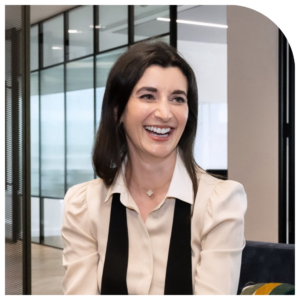Harvey John
Unit 2 Ferry Wharf
Hove Enterprise Centre
Basin Road North
Portslade, East Sussex
BN41 1BD
In an era where accountancy, legal and consultancy practices are being reshaped by technology, evolving client expectations, and shifting workplace dynamics, Victoria Price offers a fresh and forward-thinking perspective on the future of tax and accountancy services. In this Future of Job interview Victoria shared her insights on how firms can foster inclusive strategy development, adapt to AI-driven client interactions, redefine the value proposition, and help young professionals navigate the industry with confidence.
Leadership Profile:

Rethinking Strategy: A Bottom-Up Approach
I started out by asking Victoria to share her insights on her firm’s innovative approach to a team strategy day – I’d spotted a post on her LinkedIn feed about this recently and was curious to hear more.
Essentially instead of the senior leaders at A&M leading discussions, three primary sessions – Culture, Technology, and Learning – were led by junior team members.
Victoria explained that the team used live tech-enabled surveys to collect feedback and present the findings in word clouds, showcasing their digital skills in a real-world way. They then chose an innovative way of including everyone in the feedback process:
“The Analysts purposely put all of the senior people in one feedback group by themselves,” Victoria explains. “They said, ‘We’ve done that on purpose because we don’t want your voices to be the loudest. We want more junior people to be able to share their thoughts.”
She went on to say that a refreshing aspect of the strategy day was intergenerational learning.
“Rather than the usual ‘let us impart some wisdom on you,’ we actually had the more junior people teach us a few new tricks… ”.
Discussing the Learning Session, Victoria highlighted that “One of the main themes that came across strongly was that a learning environment is something that is really important to the more junior people in the team… They want to be in an environment where they can absorb, gain skills, where they’re doing different things.”
It was very clear that the A&M strategy day had been a success in breaking down the usual hierarchical methods of communication which in turn led to a more collaborative and inclusive set of outcomes.
The Changing Nature of Professional Services
During our discussion, Victoria and I explored how the professional services sector is facing a major shift, particularly in how technology and AI are transforming client interactions. Victoria highlighted that a key challenge is how the team is using AI to assist with technical advice.
Victoria reflected on how professional advice has changed since she began her career.
“When I first started in my accountancy career over two decades ago, clients would phone you up and say, ‘What’s the treatment on this expensive leased car, for example?’ And that was valuable advice to be paid for. Now, that information is readily available online, so we have to provide a higher level of insight.”
“Clients now will message in and say, ‘I’ve asked the (AI) tool, and it says the answer is this… but is that the answer?’”. She went on to say “There was one absolutely brilliant email where the client essentially said, ‘I’ve ran it through ChatGPT and unless you can tell me something extra, I’m not paying you!’”
Humour aside, this quote highlights a fundamental change in how professional advisors provide value. Gone are the days when professionals were paid simply for providing factual answers. Now, they must:
- Provide context and interpretation
- Offer insights specific to individual client situations
- Demonstrate value beyond basic information
Victoria went on to explain that A&M have developed their own proprietary LLM to enhance the client experience and that this is allowing them to move from being information providers to strategic advisors, synthesising information and delivering real value to clients.
The Death Knell for Billable Hours?
We went on to discuss how with professional services traditionally relying on time-based billing, and AI now accelerating many processes, the revenue model must inevitably evolve. Victoria offered a nuanced perspective on this shift, highlighting the mounting challenges to the traditional billable hours structure.
“It’s been something we’ve been talking about for over a decade,” she explains. “The idea that more people equals more hours, equals more revenue has been tested for years and will continue to be – because efficiency doesn’t necessarily require more people.”
This shift is being driven by several key factors:
- Technological Efficiency: AI and automation are significantly reducing research and administrative time.
- Changing Client Expectations: Clients are increasingly unwilling to pay for time spent rather than value delivered.
- Complexity of Advice: While tax and legal frameworks are being simplified in some areas, globalisation and evolving regulations mean advisory work is becoming more intricate.
Victoria sees the industry transitioning from a model based on hours worked to one focused on problem-solving and strategic insight. “The profession is moving towards value-based pricing, where expertise, judgment, and impact are the real currency.”
For professional services firms, this means rethinking how they measure success – not in hours logged, but in the value created for their clients.
Skills of the Future: Moving from Digital Interactions to Meaningful Professional Connections
I was keen to get Victoria’s perspective on the skills she sees as critical in professional services in the future.
She explained that while technical knowledge and ability to communicate digitally is critical, attitude, problem-solving skills, and a willingness to learn will be the real differentiators.
“You need a certain level of intellect to work in tax and accountancy, but I’d always prefer to have someone with a great attitude, enthusiasm, and a collaborative mindset over someone who is technically excellent but disengaged,” she explains.
The ability to transition from digital communication to in-person relationship-building is another key skill for future professionals. “People buy from people they trust. You can only take online interactions so far, until you meet someone in person, you don’t really build that rapport,” she adds.
Victoria reflected on the power of her own network and how she had built that over many years of face-to-face meeting and events – way before LinkedIn. She recognised that for younger professionals, networking can feel intimidating, especially when stepping into rooms filled with experienced industry figures. So she offered the following advice:
- Prepare conversation starters (“What do you do?” “Where do you work?”)
- Recognise that discomfort is normal
- Follow up after initial conversations to build lasting relationships
“It’s not about just collecting contacts. It’s about meaningful engagement. Ask questions, be curious, and look for ways to collaborate,” she advised.
Building a Personal Brand on LinkedIn
With over 10,000 followers and the accolade of being a ‘Top LinkedIn Voice’, I asked Victoria what advice she would offer others looking to build a personal brand on LinkedIn.
She started out by saying that a strong personal brand is no longer a ‘nice to have’, it’s essential for professional growth. She sees LinkedIn as more than just a networking platform; it’s a tool for influence, credibility, and meaningful engagement.
Victoria believes that authenticity is the foundation of a successful personal brand. She advises professionals to:
- Be visible and vocal: Share your experiences, successes, and even challenges to build genuine connections.
- Make complex topics digestible: Break down industry insights so they’re accessible to a wider audience.
- Engage consistently: It’s not just about posting – it’s about starting conversations and building relationships.
- Use LinkedIn to create impact: Whether highlighting workplace issues or championing diversity, your platform should reflect what you stand for.
“Building a brand isn’t just about personal gain,” she adds. “It’s about lifting others up, sharing knowledge, and creating a space for important conversations.”
For those looking to enhance their LinkedIn presence, Victoria’s advice is simple: be consistent, be authentic, and add value to your network. It’s these elements that turn a profile into a powerful professional asset!
Final Thoughts
As with many other sectors, the tax and accountancy profession is evolving rapidly, and people (at all levels in their career) who embrace adaptability, continuous learning, and collaboration will be the ones who thrive. Victoria Price’s insights reinforce the importance of shifting away from outdated structures, whether it’s breaking hierarchical barriers in strategy, redefining value in professional services, or strengthening human connections in a digital-first world.
By fostering an inclusive, forward-thinking mindset, professional advisors and businesses alike can navigate change with confidence.
Success in this new era won’t just be about knowledge. It will be about how effectively we apply it, share it, and use it to create meaningful impact.
To listen to the full interview visit our Leadership Lab podcast on Spotify.







